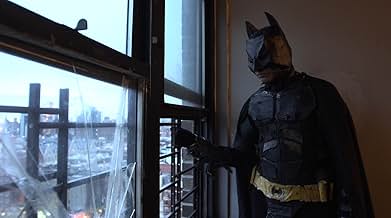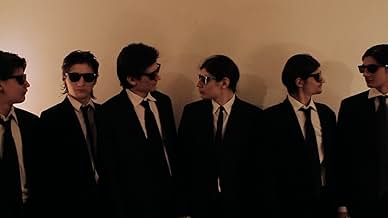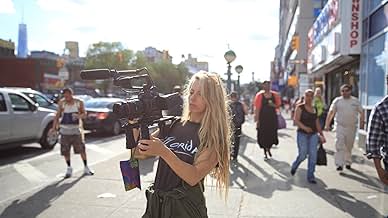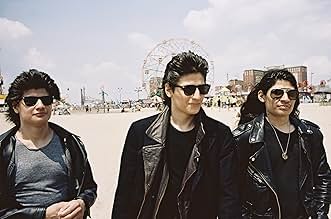Confined in an apartment from a New York housing project, the six Angulo brothers learned everything they know about the world through watching films and spend their time reenacting their fa... Read allConfined in an apartment from a New York housing project, the six Angulo brothers learned everything they know about the world through watching films and spend their time reenacting their favorite movies with intricate homemade costumes.Confined in an apartment from a New York housing project, the six Angulo brothers learned everything they know about the world through watching films and spend their time reenacting their favorite movies with intricate homemade costumes.
- Awards
- 7 wins & 15 nominations total
Christian Bale
- Self
- (archive footage)
- (uncredited)
Amanda Plummer
- Self
- (archive footage)
- (uncredited)
Isabella Rossellini
- Self
- (archive footage)
- (uncredited)
Featured reviews
I thought this documentary was a mess. Sketches of information were given to us and left up to the viewer to fill in the blanks. First and foremost, what is going on with the parents? We know that the father is abusive toward the mother and has kept her virtually locked away from her family and society. Okay, we get that. But then it shows a scene of her out jogging. Hello! Would you care to elaborate on why this woman who has been abused for 20 years is out exercising? Why did she decide to call her mother after all these years? If she is going outdoors now, too then does she plan on leaving him? Does she realize how sick her husband is? Well, we don't know what she thinks because it appears the film maker never asked her.
The father, who is the central character here, is shown as a lazy drunk who either is paranoid or uses his distrust of society as a reason to sit at home all day and drink. Why doesn't the filmmaker get him to talk so we can figure out if he's a leach or mentally ill? Does he abuse his kids, too? If he kept his kids inside all those years, he doesn't seem too upset that they're going out. And wait.....is that him and his wife walking hand and hand through a park together? If you find the 20/20 story somewhere then I recommend watching that instead of this. You'll come away with twice the understanding in half the time.
The father, who is the central character here, is shown as a lazy drunk who either is paranoid or uses his distrust of society as a reason to sit at home all day and drink. Why doesn't the filmmaker get him to talk so we can figure out if he's a leach or mentally ill? Does he abuse his kids, too? If he kept his kids inside all those years, he doesn't seem too upset that they're going out. And wait.....is that him and his wife walking hand and hand through a park together? If you find the 20/20 story somewhere then I recommend watching that instead of this. You'll come away with twice the understanding in half the time.
Greetings again from the darkness - from the Dallas International Film Festival. In what is one of the oddest real life stories I have ever seen, director Crystal Moselle takes her camera inside the Lower East Side apartment of the Angulo family – 6 brothers, one sister, and their parents. In their spare time, the kids re-enact movies within the apartment using elaborate costumes, sets and props. And no, that's not the odd part.
Despite being mostly teenagers, these siblings have only left their apartment a few times in their life – a very few times maybe once or twice a year, and not at all one year. They have been home schooled by their mother and are quite charming and articulate, despite the quasi-prison environment. The kids are not abused in the physical sense, but an argument can be made that mental anguish is in play here.
Their movie scenes are fun to watch, especially given their Tarantino leanings with Reservoir Dogs and Pulp Fiction. Ms. Moselle manages to capture a significant amount within the confines of the apartment. Her interviews with the boys are enlightening, but it's the mother that provides the most context. Her regrets and dashed dreams for her kids cause her much pain, and it's quite clear that the dad has some type of psychological vice grip on the family. The dad raises some eyebrows when he states "My power is influencing people". As viewers, we don't see this, but there is physical proof to his claim.
With no shortage of powerful moments, there are still two that jump off the screen. The first occurs as the boys head out on their own to watch their first movie in a real theatre, and then have such a fan boy moment after watching The Fighter. The second involves the mom having a conversation with her mother after not speaking for more than two decades. It's an emotional moment.
We can't help but like the boys and pull for them to find some normalcy outside the walls of the apartment. Their final film project needs no additional commentary as the lead character watches various emotions travel past his window fitting since a NYC apartment window provided this family its only glances at the real world for so many years.
Despite being mostly teenagers, these siblings have only left their apartment a few times in their life – a very few times maybe once or twice a year, and not at all one year. They have been home schooled by their mother and are quite charming and articulate, despite the quasi-prison environment. The kids are not abused in the physical sense, but an argument can be made that mental anguish is in play here.
Their movie scenes are fun to watch, especially given their Tarantino leanings with Reservoir Dogs and Pulp Fiction. Ms. Moselle manages to capture a significant amount within the confines of the apartment. Her interviews with the boys are enlightening, but it's the mother that provides the most context. Her regrets and dashed dreams for her kids cause her much pain, and it's quite clear that the dad has some type of psychological vice grip on the family. The dad raises some eyebrows when he states "My power is influencing people". As viewers, we don't see this, but there is physical proof to his claim.
With no shortage of powerful moments, there are still two that jump off the screen. The first occurs as the boys head out on their own to watch their first movie in a real theatre, and then have such a fan boy moment after watching The Fighter. The second involves the mom having a conversation with her mother after not speaking for more than two decades. It's an emotional moment.
We can't help but like the boys and pull for them to find some normalcy outside the walls of the apartment. Their final film project needs no additional commentary as the lead character watches various emotions travel past his window fitting since a NYC apartment window provided this family its only glances at the real world for so many years.
'The Wolfpack' doesn't come together
'The Wolfpack' is a film like no other. Sometimes that works well as it did in 'Inception', 'Pan's Labyrinth' and 'Blue Velvet.' At other times, it fails horribly, like it did in one of David Lynch's latest films (I stopped keeping up after a couple terrible films), 'Inland Empire.' 'The Wolfpack' is not completely terrible. It is interesting and takes on a unique subject. However, the film lacks focus and doesn't address the issues it highlights in any concrete manner.
I have the sense the director, Crystal Moselle, just ran into the family somewhere and decided to film them on a lark. Then after a couple of years, she decided to make a movie of it because graduation time in film school required her to present a film and the footage of nine people holed up in a Lower East Side tenement apartment was the only material she had available. Point is, there was no forethought in what the director/creator was doing, and it shows in the film.
Don't get me wrong. The film is interesting, and it's completely pointless. It's not quite surreal enough to stand on its own; it's far too repetitive for that. A dramatic moment in the film is when five of the brothers finally step out of the apartment together and see a film in a theater. That's it. While it might be dramatic for the brothers, the film doesn't convey that. The brothers also wonder aimlessly around Coney Island, and yes, the whole family takes an outing to a farm.
As a teacher I once had was fond of asking when I presented a paper, "So what?" So what indeed. With a subject this compelling, it's a shame there was only documentation of random repetitiveness. That isn't enough.
Rating: Rent it. It's been a long time since I intensely desired that a film end. It wasn't because I was uncomfortable with the subject, it was the feeling that I was ultimately just watching paint dry that made me want to leave. It's hard to believe that the film is only 80 minutes long.
Although the feelings of claustrophobia in the film's apartment work well on a large screen, there is not enough in the film to make it worth seeing in the theater. However, it wouldn't be a bad rental or better yet, a good sociological treatise. A cursory view of articles about the film tell us far more about the family than the film does, and that's a shame.
Peace, Tex Shelters
'The Wolfpack' is a film like no other. Sometimes that works well as it did in 'Inception', 'Pan's Labyrinth' and 'Blue Velvet.' At other times, it fails horribly, like it did in one of David Lynch's latest films (I stopped keeping up after a couple terrible films), 'Inland Empire.' 'The Wolfpack' is not completely terrible. It is interesting and takes on a unique subject. However, the film lacks focus and doesn't address the issues it highlights in any concrete manner.
I have the sense the director, Crystal Moselle, just ran into the family somewhere and decided to film them on a lark. Then after a couple of years, she decided to make a movie of it because graduation time in film school required her to present a film and the footage of nine people holed up in a Lower East Side tenement apartment was the only material she had available. Point is, there was no forethought in what the director/creator was doing, and it shows in the film.
Don't get me wrong. The film is interesting, and it's completely pointless. It's not quite surreal enough to stand on its own; it's far too repetitive for that. A dramatic moment in the film is when five of the brothers finally step out of the apartment together and see a film in a theater. That's it. While it might be dramatic for the brothers, the film doesn't convey that. The brothers also wonder aimlessly around Coney Island, and yes, the whole family takes an outing to a farm.
As a teacher I once had was fond of asking when I presented a paper, "So what?" So what indeed. With a subject this compelling, it's a shame there was only documentation of random repetitiveness. That isn't enough.
Rating: Rent it. It's been a long time since I intensely desired that a film end. It wasn't because I was uncomfortable with the subject, it was the feeling that I was ultimately just watching paint dry that made me want to leave. It's hard to believe that the film is only 80 minutes long.
Although the feelings of claustrophobia in the film's apartment work well on a large screen, there is not enough in the film to make it worth seeing in the theater. However, it wouldn't be a bad rental or better yet, a good sociological treatise. A cursory view of articles about the film tell us far more about the family than the film does, and that's a shame.
Peace, Tex Shelters
In Wolfpack, winner of the Sundance Grand Jury Award (2015), the Angulo family is indeed alone and secluded from its environment. Secluded in their Lower Eastside of Manhattan apartment, the 6 children have rarely gone outside because father deems New York too dangerous. That's not the exceptional part of this odd-ball documentary.
The WOW factor is that the kids have grown up relatively unscathed by their isolation. Their saving grace has been their movie addiction, wherein they re-enact scenes from famous films such as Reservoir Dogs and The Dark Knight. Although we don't actually see them filming, we do watch them create ingenious costumes and devise tableaux to emphasize the drama, albeit fictional, found outside their cramped world. As in the recent Me and Earl and the Dying Girl, young people are turning to movies for their societal awareness and outlet for their creative impulses. It could be much worse.
That's all there is, Folks. First-time helmer Crystal Moselle doesn't allow much more depth, for instance on what makes their strong but not particularly articulate father, who gave his children Sanskrit names, do the things he does like imprisoning his kids to avoid their ruin from the streets of New York. Or why mom has been mostly withdrawn yet loving. However as in Grey Gardens, we are privileged observers without restraint, a virtue in documentary film making.
It's just that beyond the cardboard box Batman costumes and impressive toy guns, not much else happens. Perhaps it's the Seinfeld "about nothing" motif but only without Jerry's wit.
The WOW factor is that the kids have grown up relatively unscathed by their isolation. Their saving grace has been their movie addiction, wherein they re-enact scenes from famous films such as Reservoir Dogs and The Dark Knight. Although we don't actually see them filming, we do watch them create ingenious costumes and devise tableaux to emphasize the drama, albeit fictional, found outside their cramped world. As in the recent Me and Earl and the Dying Girl, young people are turning to movies for their societal awareness and outlet for their creative impulses. It could be much worse.
That's all there is, Folks. First-time helmer Crystal Moselle doesn't allow much more depth, for instance on what makes their strong but not particularly articulate father, who gave his children Sanskrit names, do the things he does like imprisoning his kids to avoid their ruin from the streets of New York. Or why mom has been mostly withdrawn yet loving. However as in Grey Gardens, we are privileged observers without restraint, a virtue in documentary film making.
It's just that beyond the cardboard box Batman costumes and impressive toy guns, not much else happens. Perhaps it's the Seinfeld "about nothing" motif but only without Jerry's wit.
I enjoyed this.
I thought the nature of the family and the back story made the audience easily interested.the cuts to video footage of cinema footage and the boys leaving the apartment was an absolute winner.
While we don't get a full back story on the dad and his impact its impact is evident through the boys interaction with him. His dis like of or non acceptance is pretty evident by the way he acts when the boys finally go on a road trip. I liked it, great footage, easy to like the rogue characters and enough left unexplained to make it a good film overall
I thought the nature of the family and the back story made the audience easily interested.the cuts to video footage of cinema footage and the boys leaving the apartment was an absolute winner.
While we don't get a full back story on the dad and his impact its impact is evident through the boys interaction with him. His dis like of or non acceptance is pretty evident by the way he acts when the boys finally go on a road trip. I liked it, great footage, easy to like the rogue characters and enough left unexplained to make it a good film overall
Did you know
- TriviaThis film was partially supported by the Adrienne Shelly Foundation, a nonprofit organization that awards grants to female actors, writers, and/or directors of short films, feature films, and documentaries. The foundation was created by Andy Ostroy, the widower of actress, writer, and director Adrienne Shelly, after Shelly was murdered in 2006 at the age of 40.
- Crazy creditsAfter the ending credits have rolled, a wolf howls
- ConnectionsFeatured in Subject (2022)
- SoundtracksThis Is Halloween
Written by Danny Elfman
Performed by The Citizens of Halloween Town
Published by Buena Vista Music Company
Courtesy of Walt Disney Records
- How long is The Wolfpack?Powered by Alexa
Details
- Release date
- Country of origin
- Language
- Also known as
- Wolfpack: lobos de Manhattan
- Filming locations
- Production companies
- See more company credits at IMDbPro
Box office
- Gross US & Canada
- $1,301,696
- Opening weekend US & Canada
- $43,920
- Jun 14, 2015
- Gross worldwide
- $1,414,140
Contribute to this page
Suggest an edit or add missing content































